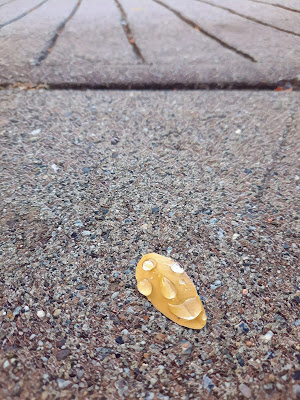Breaking Bread
"The imagination must come before the implementation. Our culture is competent to implement almost anything and to imagine almost nothing. The same royal consciousness that make it possible to implement anything and everything is the one that shrinks imagination because imagination is a danger. Thus every totalitarian regime is frightened of the artist. It is the vocation of the prophet to keep alive the ministry of imagination, to keep on conjuring and proposing futures alternative to the single one the king wants to urge as the only thinkable one."
― Walter Brueggemann, The Prophetic Imagination
*******
Dear Kate,
It's a very small leaf, hard to believe when I saw it, hard to imagine when you didn't.
It was there up the hill when I walked my dog just now, something to behold: the space so small, the dews so large in comparison--and distinct, holding each its own corner, yet coming together, sharing the same precarious foundation. Were they in conversation, I wondered, or were they waiting together separately for the sun to dissolve all their differences? It's gonna all work out, but we ain't working it.
When we find ourselves simply couldn't see things from the other side, especially when we are led to believe the "side" we take speaks the most (if not all) about who we are and that the world seems to divide itself neatly into 50/50, do we ever wonder if the problem is not mainly festering on the other side, at the other end?
I was catching up, 13 years late, with what was called one of the best television series, "Breaking Bad." It's a writer strikes gold, and the rest of the production comes along for the discovery. In an age when movies are written to play like TV, catering to the lowest common denominators and habitually deficient attention of the audience, "Breaking Bad" breaks new ground for being old-school, scene after scene giving the time and space for the human dramas to play themselves out, risking the wrath and impatience of it patrons, winning them over with the best special effect of film art: the screenplay.
The playing field is Albuquerque, New Mexico, a small, precarious leaf where we meet blatantly racist and sexist personality who we could see as our brother, trying to care for us in his own flamboyant but tentative ways, puritan family with checkered lineage, if we could tell who stands on which square, and, at the core of it all, a tragicomic anti-hero who struggles, remembers what it means to be human. I watched the third episode last night: it contains the saddest death scene I have seen in my whole life. And I probably have a thousand movies in me.
Imagination, you will need that if you want to rest on the little leaf, granted often feel like waiting for the sun to dissolve us all, with those whom we couldn't possibly imagine ourselves to be, yet must imagine the human beings that they are. How do we "eradicate racism" without eradicating our brothers? How do we hug a tree without pushing our sisters away? How do we see our checkered past without seeing only black and feeling white ourselves?
"Every totalitarian regime is frightened of the artist." Be a real artist. Write until you strike gold.
Yours, Alex



Comments
Post a Comment